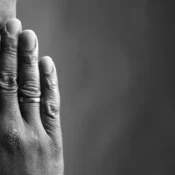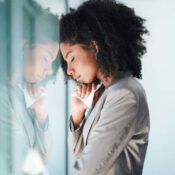My reflection on a pandemic loss – a year later
This story was hard for me to write because I struggled to put my thoughts into words. Hopefully, as I start writing, things will begin to make more sense.
I will begin my story with my aunt passing away from Covid-19 in 2020. Since my pre-teen years, my aunt lived with me and my family temporarily until she could get back on her feet and find her own housing. We would go to church together and I remember being there when she was getting married.
She had been battling Parkinson’s disease for at least a decade before her demise. I had not seen her for seven years (a story for another day) before her death, so it was shocking news to my family and me.
Words cannot describe how I truly felt. I honestly felt helpless, hopeless and suicidal. This was because her death along other deaths (during the 2020 pandemic and before) stirred up some feelings of pain and anxiety, c. I had nightmares, I could not sleep well and could not look after myself properly. Getting out of bed every single day was a struggle.
I remember hearing the news about Covid 19 at its early stages and how many people were dying. It was overwhelming to hear of the deaths of the nurses, doctors, health care professionals and other people that I didn’t know. Little did I know it was coming closer to home. My aunt’s death unearthed other unsettled grief in my life.
At the tender age of 15, I lost my grandad in 2013 (my mother’s dad). To give you context, I will share a little more about myself. I was born in Poland, however, I grew up in the UK to parents of African descent. I had never travelled to the African continent (my motherland), so I grew up without physically meeting any of my maternal and paternal grandparents.

It hurt that I didn’t have fond memories of my grandad, simply because I had never met him face to face. It seemed odd to grieve for someone you have never met physically but we did communicate over the phone and had built a relationship. Not mentioning the fact that I had heard numerous stories about my grandad and who he was as a person from my parents.
Although, I can’t explicitly remember my granddad’s cause of death. I do remember the day my mother received the phone call from her family back home to notify her of his death. I was at home in my parents’ bedroom talking to them, and then my mum received a phone call from her relatives in Nigeria that day. I don’t specifically remember the exact date of the day, but I remember the year, which was in 2013.
I remember feeling crushed, like the ground had somewhat swallowed me up. The fact that I would never be able to meet my grandad physically crushed me. He was never going to see my milestones like passing my GCSE exams and passing college then going to university. The fact that if I did ever travel to Nigeria, he would never be there anymore.
The fact that we would not be able to bond with each other as grandad and daughter. I had to grieve for all of that too.
My parents were also grieving, they felt helpless and hopeless. To make matters worse, my family could not travel back home to Nigeria for the funeral and say goodbye to make peace with the situation due to financial problems, and other issues at the time.
Despite only being 15, I felt I had no one else to turn to but myself. This meant my grief was and still is undealt with. To this day, thinking about it hurts me and brings me to tears.
I also remember when Belly Mujinga, George Flloyd and Nicole Thea (may they rest in peace forever) died. Their deaths brought me so many flashbacks. I had nightmares of close family members dying around me. I had flashbacks of previous pain, anxiety and most importantly, the Parkinsons disease that claimed my aunt’s life and Covid-19 happening in the first place.
All of this made me feel like I did not want to be alive anymore. Although, I do not know any of these people on a personal level. I was still grieving as I felt like they were a part of my family (shared grief).

The 2020 pandemic has just triggered me a lot emotionally, physically, and spiritually. At times I laugh or smile because I read or see something funny. But soon after a dark cloud creeps in, and I end up crying. My emotions are still inconsistent.
Sometimes all I do is cry for the whole day. All-day, every day. I am currently seeking professional help.
I have had counselling sessions from the counselling department at my university. My counsellor tried to help me process my feelings about my grief and get me to see hope. She also suggested things I could do like exercising and going for walks whilst acknowledging there is no right or wrong way to grieve.
I am still battling with my anxiety and flashbacks, it’s a work in progress. But I can say, my anxiety has improved a lot over the past few years. I can now be present and look people in the eye whilst talking to them, and I smile a lot more. I no longer feel shy to talk to people and can voice my opinion in social situations like at university during my group projects. Something I could not do before.
There has been progress on my healing journey but nonetheless, I am still angry that the 2020 pandemic happened and the disruption it has caused to our life as a society, both locally and globally. As I am typing this reflection, my heart is still heavy as I struggle to accept the implications of the pandemic.
I was raised a Christian. However, dealing with grief has made me question the Bible. In all honesty, my mind cannot comprehend half of what happened during the 2020 pandemic. I could not pray, wake up, shower, eat, sleep and repeat. As stated earlier, I had nightmares in my sleep. I struggled a lot.

I hated when fellow Christians in my community would compare my grief to someone else’s. I felt very upset at that time and still do when people try to tell me someone has it worse, but they don’t behave in the same way as I do (feeling hopeless and crying every day). I felt like my grief was dismissed, but I know that it is valid.
So a part of me feels angry at ‘the church’(generalisation for all Christian communities) for not equipping people to deal with grief adequately. I would have loved to have been able to rely on my church community to support me during these low moments.
I do understand that people don’t always know what to say or do but being empathetic could go a long way and would have helped me process my grief.
I’m still reflecting on all that I have shared and I wish those reading my story can relate to triggers and grief that the 2020 pandemic brought. Can find the strength to carry on without their loved one and embark on their healing journey. Peace and love to everyone.
Thank you to Balanced Wheel for the opportunity to share my story.
Mercy Blackstarr
Author
One thought on “My reflection on a pandemic loss – a year later”
Add a Comment
Recent Posts
Grief and Mental Health – Round Post
Collective Grief – Round Post
Getting Over The Death Of A Loved One
Your Story
Matters
info@balancedwheel.co.uk



Insightful